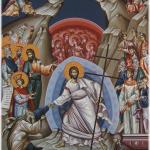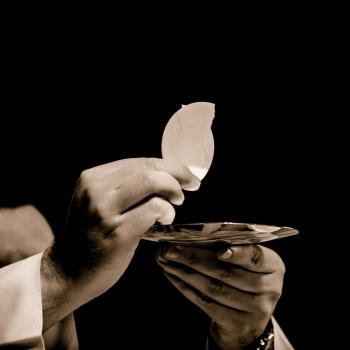When he was at the table with them, he took bread, blessed and broke it, and gave it to them. Then their eyes were opened, and they recognized him… (Lk 24:30)
I grew up a Methodist and when I felt called to ordained life, I inevitably started out as a Methodist. But six years in England and worshiping with Anglicans left me with a spiritual life squarely focused on receiving communion on a weekly basis.
So, imagine my surprise when I came home to serve in a church where we celebrated communion once a quarter whether we needed to or not. Far from focusing on a weekly celebration, the first church that I served believed that if you do it all the time, it isn’t special anymore.
There were other factors that prompted me to pursue ordination in the Episcopal Church but that difference was one of the most important ones.
So, what does happen in the celebration of communion and why is it central to Christian spirituality?
For roughly the last 500 years, Christians have differed over the answer to that question, and these differences have hardened into what the proponents of each view call theories. Those theories play out in the language that people use to describe communion, the frequency with which they celebrate it, what they do with their hands, and even what they call the furniture on which the bread and wine – or grape juice is placed. And that’s just a list of some of the differences.
Simply put, there are three theories:
One theory holds that communion is symbolic and it is an act of remembering. We celebrate communion because Jesus celebrated a similar meal with his disciples and because Jesus told his disciples to do it.
According to this theory communion is an ordinance – a prescription. But nothing else happens. So, the adherents to this theory avoid using the language of sacrament.
Celebrating communion is a bit like the Fourth of July. It reminds us of Christ’s work on our behalf. The stories associated with it inspire us. And the story of the last supper is an occasion for gratitude. But what we celebrate happens entirely in the past.
The second theory is sometimes described as “real presence”. Based on a different set of Bible passages, this theory holds that when we celebrate communion Christ is present when we break the bread and drink from the cup.
Based on this theory, you might say Jesus joins us and offers his body and blood to us again, just as he did to the Apostles. It’s not that the last supper or the crucifixion of Jesus doesn’t matter. But its observance is a bit like a Civil War reenactment, the difference being that the central character in the story makes it real to us again.
The third theory is called transubstantiation. This theory argues that when the bread and wine are blessed or consecrated, they become the body and blood of Christ. This doesn’t mean that the bread visibly becomes human flesh or that the wine becomes blood in a visible fashion. But – based on passages in John’s Gospel and Paul – this view holds that the Holy Spirit acts upon these elements to transform them, making them the instrument of God’s saving work. And the more we take Christ into us, the more we become like Christ.
Here, too, history is important and in one sense, unrepeatable. But the theory of transubstantiation holds that Jesus continues to work that miracle in the life of his church. We aren’t just inspired, then. God works on us, in us, and through us.
This is why people who believe in real presence and transubstantiation describe communion or the Eucharist as a sacrament instead of an ordinance. Yes, Jesus commanded we celebrate communion but it is also a reality he enacts in our lives.
So there are the three theories, and each highlights a different dimension of communion: remembrance, presence, and transformation. Now, much of the debate down through the centuries suggests that you must choose one. But that isn’t true and you shouldn’t let conversations about communion rob you of a rich understanding of its spiritual benefits.
For one thing, the word, “theory”, is really unfortunate. It’s a modern term. It is mechanistic, and it suggests that they are mutually exclusive.
The ancient church didn’t think in those terms. It believed that communion was a God-given gift, a means of grace. So, the word, theory isn’t just alien to the mindset of the ancient church, the ancient church would have argued that we can’t use the word theory because we it isn’t a natural process, it is the work of God. That’s why the ancient church called communion a sacrament and a mystery.
That’s also why the church didn’t offer theories about communion but told stories and used metaphors and images. Whenever we talk about God, we have to work from what we know. We are forced to use the familiar to understand the transcendent.
That doesn’t mean the church didn’t think communion was real. To the contrary the ancient church argued that if you didn’t grasp just how real the work of Christ was on the cross and in communion, you didn’t really know what was at stake in life at all.
But the biggest problem with talking about theories of what happens in communion is that both the Bible and the church talked about communion using all three ideas. It talked about communion as an act of remembering, as a reenactment in which Jesus is present to us, and as the transformation of bread and wine into the body and blood of Jesus. If you listen closely, you will hear all three emphases in the communion liturgy.
But a better question about what happens in communion, is this: What can happen to us, to the church when we receive it?
This will sound totally off point but lately we have been watching the TV series, the Mandalorian. It is a Star Wars spin-off and you might describe it as a space western featuring a lone bounty hunter who belongs to a sect of warriors called the Mandalorians. Frequently, when they make a difficult choice or sacrifice after they have chosen the path that their tradition prescribes, they will say, “This is the Way”.
I’ve wondered why anyone writing a popular television show would feature a hero whose behavior is tied to a tradition and I’ve come to the conclusion that it is the same reason that a large number of young Americans are drawn to the liturgy we use when we celebrate communion. In a world that is increasingly unmoored, unprincipled, and directionless, a growing number of people have concluded that the chaos we face – both socially and personally – is rooted in our failure to follow a way – a tradition – a pattern.
It turns out that human beings can’t just accept certain truths and then live without revisiting the truths that they commit themselves to. What gets our attention gets us. And if we lack a pattern of worship, if we fail to take it in, and revisit it on a regular basis, then we drift. And something else takes its place.
When I talk to people who don’t go to church regularly, but profess to be Christians, I don’t worry about the church. God will take care of the church. I worry about the spiritual wellbeing of the people who approach their faith in that fashion. And I worry about what will happen in their lives when they are tempted by our culture’s excesses and insanities, when they suffer loss or failure, and when they approach the end of their lives and wonder what it was all about.
I worry because they may think of themselves as Christians but they don’t know “the Way” and our worship – which is organized around the celebration of communion – is the Way – Jesus’s Way. It is given us as a grounding, a centering, a place to stand, a source of wisdom, and direction.
So, what can happen today in your life is that you can choose the Way or continue in it. And you can do all three things that have made communion that way for billions of people down through the centuries. You can remember that your eternal wellbeing has already been forever secured in the life, death and Resurrection of Jesus Christ. As you receive communion and pray for Jesus to be present to you as you kneel. And as you receive the body and blood of Christ, you can ask God to use that gift to transform your own life.
If we expect our lives and the world to be marked by love, wisdom and grace- we will need to receive it from the one who perfectly embodied all three and shares his life with us. This is the Way.












